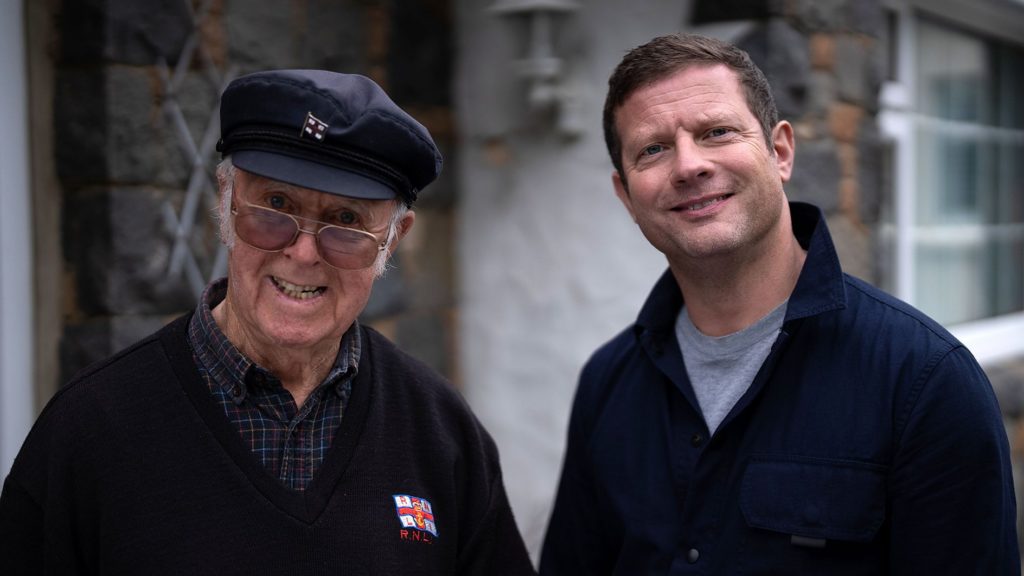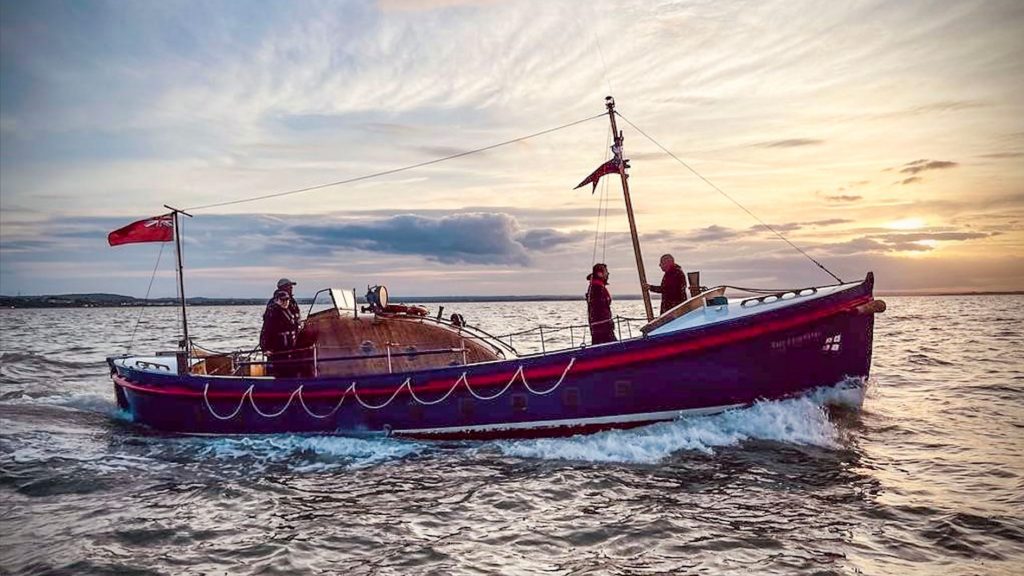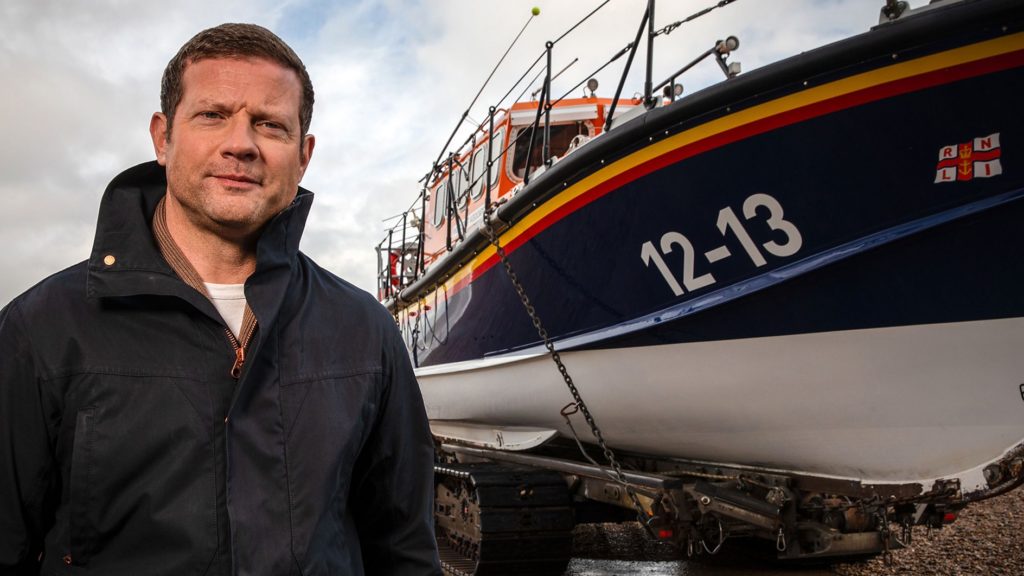PRESENTER Dermot O’Leary fronts a new show which commemorates the 200-year anniversary of the founding of the Royal National Lifeboat Institution (RNLI).
The second-generation Irishman, who was born in Colchester, Essex to parents who hail from Wexford, is an ambassador for the RNLI, having grown up on the east coast of England and spending time in Ireland.
The This Morning Presenter has delved into the little-known story of the RNLI’s efforts during the Second World War for a BBC documentary, Saving Lives at Sea: In World War Two.
The Saving Lives at Sea special commemorates the bicentenary of the RNLI, which was founded in 1824.
In it 50-year-old O’Leary uncovers the institution’s heroic efforts in the Second World War, where their lifeboat crews were called to serve in the most perilous of conditions, ultimately saving thousands of lives.
 Tony Hobbs and Dermot O'Leary in the new BBC series Saving Lives at Sea: In World War Two
Tony Hobbs and Dermot O'Leary in the new BBC series Saving Lives at Sea: In World War TwoHe took time out this week to tell us about the show…
Can you tell us about the project, what is the programme about?
The Saving Lives at Sea WWII special is pretty much exactly what it says on the tin. There could not be a better described title of a show that celebrates and pays homage to the RNLI’s 200th anniversary.
I love this show so much because I love my history, and especially military history. For the most part, certainly as you get older, you realise that whatever happened in the Second World War, there were remarkable feats of bravery and incredible stories of heroism.
I’ve always loved history where ordinary people are put in extraordinary circumstances. I‘ve done a few shows about the Second World War and invariably you do always walk away with a tinge of sadness, because it is largely about young men in particular, losing their lives from all sides.
What I find so brilliantly unique about this story, and why I'm so proud to be involved in it, is because for this five- or six-year period where the world is trying to kill each other, you have this kind of raggle-taggle group of largely older men whose specific role is to save lives.
That's pretty much all they care about.
It's so intertwined with what the RNLI stands for and their mantra. They don't care where you're from. They don't care what colour your skin is. They don't care if we're at war with you. If you're a soul in the sea, all they want to do is get you out. It's this unique story about these incredibly brave and stoical men who were just trying to save lives.
What's your passion for the organisation?
For me, the connection with the RNLI goes back to when I was a kid. I grew up in a small town called Colchester, which is about ten miles from the sea. A lot of my leisure time is spent by the beach and on the sea, but it's more than that for me.
Spending so much time in Ireland as a kid cemented the RNLI’s importance for me.
What is incredible about the RNLI is that when the Irish gained independence, a lot of organisations in Ireland that had any connection to Royal in the title went out the window.
You'll see the postboxes are painted green, for example. Yet the RNLI is pretty much the only institution that still encompasses all the British Isles rather than the split between the Republic of Ireland and the United Kingdom.
Plus, my parents are from Wexford which has got huge connections to the sea. My auntie was a supporter of the RNLI. And this wasn’t in Ireland, this was when she came over to Kilburn in northwest London where the nearest water is the canal.
I’d always see a RNLI station on the beaches I went to which always felt both welcoming and it could be a sense security that it was there. I suppose it felt like something to be cherished, nurtured and looked after.
What does being an RNLI ambassador entail?
I think the lovely thing about being an ambassador and being a long-term supporter of the RNLI is that I've had the good fortune to go and see some of the stations in action, and in fact the one I saw before we started filming a couple of years ago was down on the Thames, which is the busiest in the whole of the UK.
I don’t think people appreciate how busy they always are. Actually seeing it in action and talking to some of the guys and girls that go out, you realise it's pretty tough work.
And yes, of course I think there's a wonderful sense of adventure that goes along with it and a sense of giving back to your community.
But a lot of the stories don't end well, it takes a toll and the more time you spend time with them, the more admiration you have for them.
 Dermot, Chris Sandwell and two crew of the Chieftain out at sea during filming
Dermot, Chris Sandwell and two crew of the Chieftain out at sea during filmingCan you tell us a bit about your passion for history?
I got my love for history from my father's side of the family. I think a lot of immigrant families are like this.
My dad came over from Ireland, and when you grow up in the second generation of an immigrant family you have a sense of your country's history or the motherland or whatever you want to call it. It’s very much consciously part of your identity.
So, I've always been well versed and interested in Irish history. But then when my parents moved out of London, they moved up to Colchester, which is where I spent most of my youth.
There were so many Second World War bases, American air bases, it was always kind of in the shadow of growing up. I was always interested in that.
And then as I got older, when I hit 30, I realised that there was a 30-year gap between me being born and the middle of the Second World War, which is quite stark because you felt that the 1940s was a long time ago.
I think it also coincided with the series Band of Brothers coming out which I think for a lot of people was the first series that told the stories of people behind the conflict in a modern context, and told it so well, so I became fascinated with that. I'm curious as well, I love finding out about people, their stories, where they're from, where their families are from and how they got to where they’re now. That for me is the beauty of the modern world.
It's so interesting now, you meet people who didn’t necessarily know their parents, their grandparents or their great grandparents because of what happened in that five-year period.
People were sent off to live with relatives or strangers and so forth, and families got displaced. For me, during the Second World War, there isn't a greater example of ordinary people put in extraordinary circumstances. I love the micro of those people changing the course of history and I love the macro of smoky rooms and decisions being made, sometimes very instinctively. I just find that whole part of history fascinating because we're living with results of it today.
Did you know much about the RNLI at war before this project?
I like to be surprised, but I still do my research, so I have a good idea where an interview is going to go, even if I don't like to script specific questions. So, I was sort of out of my comfort zone. I love being out my comfort zone and I loved finding these stories and tales of what the RNLI did.
And also, because it spans the war, no two stories are the same. This isn't just about the boats going out and saving, let's say pilots, who had been shot down. Which is actually what I thought the whole show would be. But actually, that’s a tiny proportion of what they did during wartime.
As the kind of student of World War Two, as a supporter of the RNLI, was it still interesting to you that this is very much like an untold story?
That's one of the reasons why I really wanted to do it, because with the greatest respect, no one needs to see me doing a show about D-Day because we know so much about D-Day and I am an amateur historian.
We don't need to see me doing a show about Dunkirk necessarily, you know. But these stories, largely because the RNLI is.... It's not territorial, but it's like they are the provenance and they are the property of each crew and each station.
And so, there isn't a central historian that tells you everything. You have to really deep dive into these places. And they are so proud of the local history and that's what I found fascinating and that's why the show is so unique. It's like nothing I've hosted or watched before.
 Dermot O'Leary claims his family's move from Ireland to England inspired his love of history
Dermot O'Leary claims his family's move from Ireland to England inspired his love of historyWhat were the standout moments during the project?
I loved the fact that no two stories are the same. I think it's an interesting question because in some respects it was what I expected it to be, which was selfless acts of incredible bravery.
And so even though those acts were extraordinary and unbelievable feats, that didn't necessarily surprise me. I think what surprised me was the human cost along the way and how many how many lives were lost in the RNLI. And that puts into sharp focus that there was a war on and how the level of equipment has changed. It felt like they were still going to sea in boats from the early century.
Having been out on a couple of boats, you realise just how far the world's come, and therefore what they were working with, in the harshest of conditions, means that your admiration for that sort of fortitude and bravery is just tenfold.
How was it going out on one of the old lifeboats?
I thought it was really special. Being on there and chatting to the crew, you realise that it's not like going on a big lifeboat now, a lifeboat where you can power up and steam out for an hour and not even break a sweat.
They had so many variables to even get to the person they were trying to save in the first place. That was a brilliant experience.
You touched on the Battle of Britain and that kind of surprise of rescuing pilots and soldiers from both sides
I knew the stories behind the Battle of Britain, and I guess the show just reinforced that for me, that the crews in the Second World War were true to the RNLI mantra of “it doesn't matter if we're at war with you, we still try to save your life”.
We touch upon it, but there was a bit of push-back from the public on that at the time. It was just it was that as far as the RNLI was concerned, there’s a human in the water, and they wanted to save that human in the water.
I’ve got a mate who’s a coxswain in today's RNLI and they're still working under those same pressures. As far as they're concerned, a soul in the sea is a soul in the sea and someone that needs to be saved.
Why is this show important?
I think the show's important because it's a very unique and untold period in this country's history, with the involvement of one of this country's most cherished and valuable institutions.
I didn't know too much about the RNLI in the Second World War, but we're an island nation and this institution can touch anyone.
Anyone can need this institution on any given day where your luck runs out or fate decrees. And so, it's so important in the fabric of this country.
And I'm really proud we've examined it.

